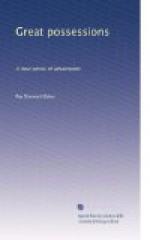As we approached in the town road I called out to him:
“Good morning.”
He paused and, to my surprise, responded:
“Are you happy?”
It had not occurred to me for some time whether I was happy or not, so I replied:
“I don’t know; why do you ask?”
He looked at me in a questioning, and I thought rather indignant, way.
“Why shouldn’t a man be happy?” I pressed him.
“Why should he be? Answer me that!” he responded, “Why should he be? Look at the world!”
With that he passed onward with a kind of crushing dignity.
I have laughed since when I have recalled the tone of his voice as he said, “Look at the world!” Gloomy and black it was. It evidently made him indignant to be here.
But at the moment his bitter query, the essential attitude of spirit which lay behind it, struck into me with a poignancy that stopped me where I stood. Was I, then, all wrong about the world? I actually had a kind of fear lest when I should look up again I should find the earth grown wan and bleak and unfriendly, so that I should no longer desire it.
“Look at the world!” I said aloud.
And with that I suddenly looked all around me and it is a strange, deep thing, as I have thought of it since, how the world came back upon me with a kind of infinite, calm assurance, as beautiful as ever it was. There were the hills and the fields and the great still trees—and the open sky above. And even as I looked down the road and saw my sardonic old friend plodding through the snow—his very back frowning—I had a sense that he belonged in the picture, too—and couldn’t help himself. That he even had a kind of grace, and gave a human touch to that wintry scene! He had probably said a great deal more than he meant!
Look at the world!
Well, look at it.
CHAPTER VIII
A GOOD APPLE
“I am made immortal by apprehending my possession of incorruptible goods.”
I have just had one of the pleasant experiences of life. From time to time, these brisk winter days, I like to walk across the fields to Horace’s farm. I take a new way each time and make nothing of the snow in the fields or the drifts along the fences....
“Why,” asks Harriet, “do you insist on struggling through the snow when there’s a good beaten road around?”
“Harriet,” I said, “why should any one take a beaten road when there are new and adventurous ways to travel?”
When I cross the fields I never know at what moment I may come upon some strange or surprising experience, what new sights I may see, what new sounds I may hear, and I have the further great advantage of appearing unexpectedly at Horace’s farm. Sometimes I enter by the cow lane, sometimes by way of the old road through the wood-lot, or I appear casually, like a gust of wind, around the corner of the barn, or I let Horace discover me leaning with folded arms upon his cattle fence. I have come to love doing this, for unexpectedness in visitors, as in religion and politics, is disturbing to Horace and, as sand-grits in oysters produce pearls, my unexpected appearances have more than once astonished new thoughts in Horace, or yielded pearly bits of native humour.




